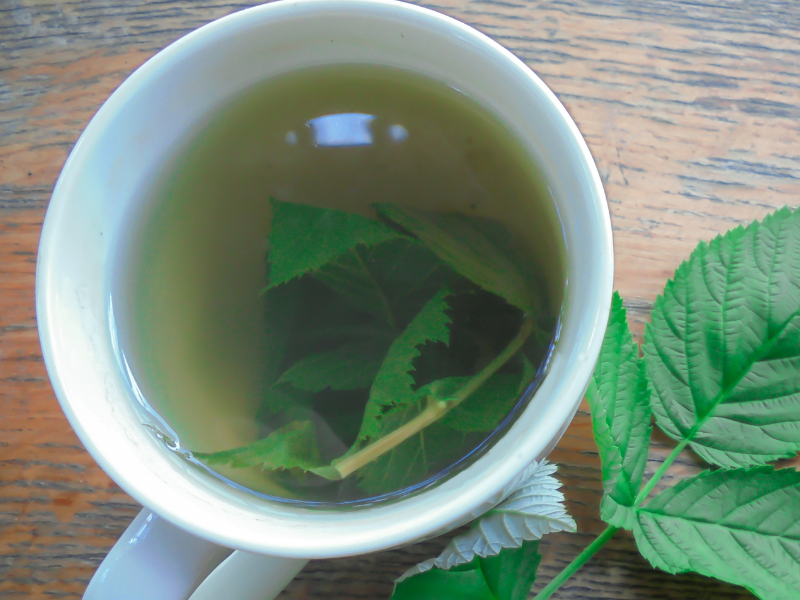Red Raspberry Leaf Tea While Breastfeeding
Red raspberries always bring to mind summer—sweet, bright, and full of life. But while the fruit gets most of the attention, it’s actually the leaves that have long been used in herbal medicine. If you’re breastfeeding and curious about red raspberry leaf tea, you’re not alone. It often pops up in conversations about postpartum recovery and natural ways to support milk supply. But is it helpful—or even safe—while you’re nursing?
We’ll look at what this tea can offer, blending scientific facts with the real-life experiences of moms who use it.

What Is Red Raspberry Leaf?
Despite the name, it’s not made from raspberries. It comes from the leaves of the raspberry plant (Rubus idaeus). These leaves are packed with vitamins (A, C, E), minerals (like calcium, magnesium, and iron), and plant compounds like tannins and flavonoids.
For generations, women have used it to ease cramps, prep for labor, and help the body bounce back after childbirth. It’s a go-to in many herbal traditions for supporting reproductive health.
The Research on Red Raspberry Leaf
Red raspberry leaf is often labeled a “galactagogue”—that means something that might increase breast milk. And while modern research hasn’t confirmed that, here’s what we know:
- There aren’t any strong clinical studies proving it boosts milk production.
- But there are plenty of anecdotal reports from moms who say it helped them.
- And just because something hasn’t been clinically studied yet doesn’t mean it doesn’t work—it just means we don’t have the research yet.
Many moms report feeling like their supply improved, their recovery was smoother, or their energy was better when drinking red raspberry leaf tea. These stories matter. While they’re not scientific “proof,” they’re real-life experiences, and they shouldn’t be dismissed.

Traditional Red Raspberry Leaf Tea Benefits
Uterine Tonic / Labor Support
- In many herbal traditions, raspberry leaf is used in late pregnancy to “tone” the uterus and help prepare it for labor. The idea is that a well-toned uterus may contract more effectively during labor, potentially shortening its duration or reducing interventions.
Red Raspberry Leaf Tea and Postpartum Recovery
- After birth, traditional use includes helping shrink the uterus (involution), reducing bleeding, easing cramping, and supporting overall postpartum healing.
- Because raspberry leaf contains minerals and antioxidants, some traditions hold that it helps replenish nutrients depleted during pregnancy and delivery.
Menstrual & Reproductive Support
- Historically, women have used raspberry leaf tea to ease menstrual cramps and regulate periods.
- It is also used in traditional remedies for digestive issues, mild diarrhea, or as a mild astringent (tightening tissues) in certain conditions.
Other Benefits of Red Raspberry Leaf
- Some herbal sources suggest raspberry leaf may help reduce morning sickness or nausea in pregnancy.
- Traditional texts sometimes attribute it mild diuretic or mild laxative effects (helping with water retention or digestion) — though again, in gentle doses.
- Some women notice that raspberry leaf tea has a gentle, relaxing effect. There’s not much research on this, but many moms say it helps them unwind.
What’s In Red Raspberry Leaf?
Even if it doesn’t increase milk directly, it might help nourish your body during recovery.
Just 30g of dried leaf contains (roughly)
- 400 mg of calcium
- 446 mg of magnesium
- 106 mg of iron
- Potassium, vitamin C, and trace amounts of A, E, B1, B2, B3, and selenium
For a tired, healing, breastfeeding body, that nutrient boost can be a very good thing.
Is Red Raspberry Leaf Tea Safe While Breastfeeding?
What the Experts Say
- LactMed: No harmful effects have been reported, but there’s not much data.
- The Women’s (Australia): Tea form is probably fine, but avoid concentrated extracts.
Possible Side Effects
- Loose stools or mild diarrhea
- A mild diuretic effect
- Rare allergies
- Some moms feel calm or even a little sleepy after drinking it
Always start slowly and keep an eye on how both you and your baby respond. Everyone reacts differently, and it’s all about finding what works for your body.
What Forms Can You Try?
Red raspberry leaf comes in a few forms:
- Tea bags
- Loose-leaf tea
- Capsules or tablets
- Herbal tinctures (more concentrated—use with caution)
Most breastfeeding moms opt for the tea, especially when blended with other gentle herbs like alfalfa, stinging nettle, or goat’s rue.

What Moms Say
There are countless stories from moms who love raspberry leaf tea postpartum. Some feel it gave them a gentle boost in supply. Others say it helped their cramps, gave them energy, or simply became a comforting daily ritual.
“With my second child, I drank red raspberry leaf tea and felt like my milk came in earlier than before” says one mom. “I sipped raspberry leaf tea daily after birth, and I felt my cramps ease faster than with my first baby when I didn’t use it”
These experiences may not be published in journals, but they’re meaningful. In the real world, sometimes that counts just as much.
An Extra Milk Boost
If you’re looking for tried-and-true milk boosters, other herbs have more studies behind them:
- Fenugreek: Popular and fairly well-researched
- Fennel: Often included in nursing blends
- Blessed Thistle: Frequently paired with fenugreek
And let’s not forget the basics
- Nurse frequently and on demand
- Stay hydrated
- Rest when you can
- Practice skin-to-skin

Why Choose Organic Red Raspberry Leaf Tea?
When it comes to herbal teas — especially if you’re drinking them daily while breastfeeding — quality matters. Choosing organic red raspberry leaf tea can give you peace of mind because:
- Fewer Pesticides: Organic teas are grown without synthetic pesticides or herbicides that could linger on the leaves.
- Cleaner Soil & Farming Practices: Organic farming supports healthier soil and reduces exposure to chemicals that could affect both you and your baby.
- Gentler for Baby: Since tiny amounts of what you consume can pass through breast milk, many moms prefer organic options to limit unnecessary chemical exposure.
- Better Taste & Aroma: Many tea drinkers notice organic teas taste fresher and less “chemical.”
- Transparency: Reputable organic brands are often more careful with sourcing and labeling, so you know you’re getting real raspberry leaf — not just a fruit-flavored blend.
Tip: Always check the ingredient label. Look for “organic red raspberry leaf (Rubus idaeus)” as the only ingredient.
So… Should You Try It?
Red raspberry leaf tea has been trusted by generations of women. It hasn’t been fully studied for breastfeeding, but that doesn’t mean it has no value.
As always, trust yourself, listen to your body, and ask for support when you need it. You’re doing an amazing job.
References and Resources
- Liebertpub -Turkyılmaz C, Onal E, Hirfanoglu IM, et al. The effect of herbal tea on breast milk production and short-term catch-up of birth weight in the first week of life. J Altern Complement Med. 2011;17(2):139-142.
- Gladstar R. Herbal Healing for Women. Simon & Schuster; 2001.
- Healthline – Red Raspberry Leaf Tea: Potential Health Benefits and Precautions
- News Medical Net – Raspberry Leaf Tea In Pregnancy: Safety, Benefits, and Research Insights


